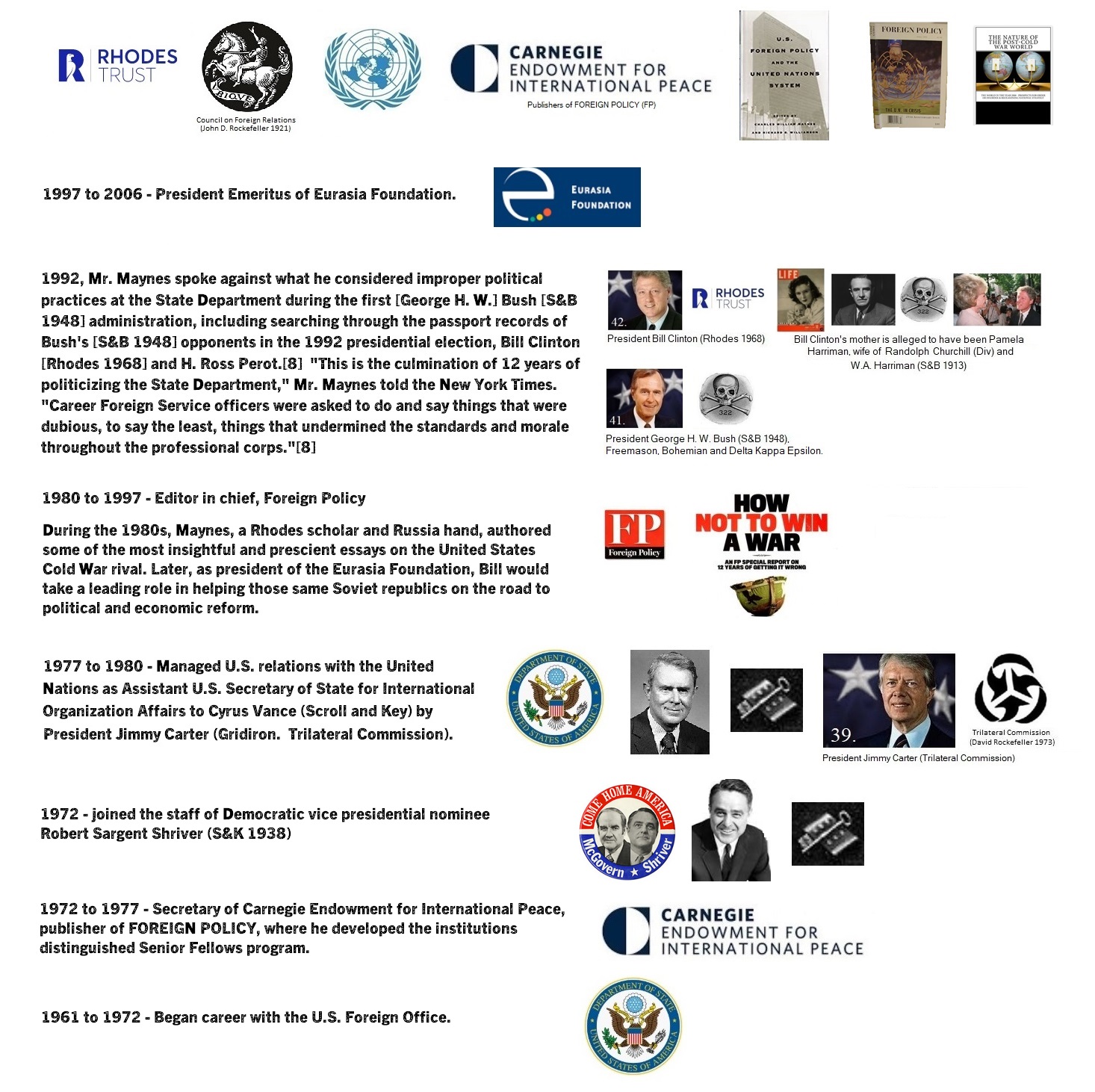
Charles William Maynes (Rhodes 1960)
Editor in Chief, FP for Carnegie Endowment for International Peace. Harvard University. Rhodes Scholar, University of Oxford. Fluent in French and Russian.[8] Bilderberg.[6]
Member of the National Academy of Public Administration, the Council on Foreign Relations, the International Institute for Strategic Studies, the Washington Institute of Foreign Affairs, and the United Nations Association.[6]
President of the International Development Foundation.[8]
Wrote many essays for the Washington Post, New York Times and other publications and often appeared as a commentator on television and radio. He was known for his ability to discuss, at a moment’s notice, foreign policy concerning any part of the world.[8]
Jun 2017 - Foreign Policy… “As FOREIGN POLICYs Longest-serving editor in chief, Charles William Bill Maynes guided readers through the collapse of communism and the rise of globalization.”[4]
1998 - Some of his comments appeared eerily prescient, as in the article for The Post in which he replied to an op-ed piece by L. Paul Bremer III, who later oversaw redevelopment efforts in Iraq for the Bush[S&B 1968] administration. Bremer urged that the United States adopt a “systematic and relentless” anti-terrorism policy that would include unilateral “military strikes” and the repeal of an executive order “banning the assassination of foreigners.”[8]
1997 to 2006 - President Emeritus of Eurasia Foundation.[4] But Bill more than recovered. For nine years, he led the Eurasia Foundation, bringing his knowledge and experience to help foster positive change in a part of the world that he had studied, observed, and helped shape for decades. There his efforts to promote political reform and democracy brought him into increasing conflict with the creeping authoritarianism of Russian President Vladimir Putin.[4]
As president of the Eurasia Foundation, Mr. Maynes kept a lower profile, but the effect of his work may have a more lasting impact. The foundation, founded in 1992, has distributed more than $360 million to help establish democratic and economic stability in the states of the former Soviet Union.[8]
1992, Mr. Maynes spoke against what he considered improper political practices at the State Department during the first [George H. W.] Bush [S&B 1948] administration, including searching through the passport records of Bush’s [S&B 1948] opponents in the 1992 presidential election, Bill Clinton [Rhodes 1968] and H. Ross Perot.[8] “This is the culmination of 12 years of politicizing the State Department,” Mr. Maynes told the New York Times. “Career Foreign Service officers were asked to do and say things that were dubious, to say the least, things that undermined the standards and morale throughout the professional corps.”[8]
1991, at the age of 52, he nearly died of complications from surgery that were followed by a bout of Guillan-Barr syndrome, a rare neurological disorder. Although he was temporarily paralyzed, unable even to blink his eyes, he astounded colleagues by keeping abreast of world events via National Public Radio broadcasts. As he told The Washingtonian magazine in 1998, I hope death doesnt happen soon, but I cant get angry if it does. Ive already been to deaths door and back.[4]
1980 to 1997 - Editor in chief, Foreign Policy.[4]
During the 1980s, Maynes, a Rhodes scholar and Russia hand, authored some of the most insightful and prescient essays on the United States Cold War rival. Later, as president of the Eurasia Foundation, Bill would take a leading role in helping those same Soviet republics on the road to political and economic reform.[4]
1977 to 1980 - Managed U.S. relations with the United Nations as Assistant U.S. Secretary of State for International Organization Affairs to Cyrus Vance (Scroll and Key) by President Jimmy Carter (Gridiron. Trilateral Commission).[4]
Mr. Maynes oversaw U.S. policy toward the United Nations and helped draft agreements that led to the independence of Namibia and a peacekeeping effort in Lebanon.[8]
He worked on the Capitol Hill staffs of Sen. Fred R. Harris (D-Okla.) and Rep. Frank Bradford Morse (R-Mass.).[8]
1972 - joined the staff of Democratic vice presidential nominee Robert Sargent Shriver (S&K 1938)[8][9]
1972 to 1977 - Secretary of Carnegie Endowment for International Peace, publisher of FOREIGN POLICY, where he developed the institutions distinguished Senior Fellows program.[4]
1961 to 1972 - Began career with the U.S. Foreign Office.[4][8]
1960 to 1962 - Rhodes Scholar, Mertion University of Oxford.[8]
Died 2 Jun 2007, from Cancer. Age 68.
Charles William Maynes Jr. was born in Huron, S.D., and was drawn to public service as a sophomore at Harvard University, when he heard then-Sen. John F. Kennedy speak.[8]
Bill is survived by his wife of 42 years, Gretchen S. Maynes; two children, Charles William Maynes III and Stacy K. Wade; two sisters; and two grandchildren.[4]
[3] - Library of Congress - Interview with Ambassador Charles William Maynes
[4] - Remembering Charles William Maynes
[6] - Charles William Maynes President,The Eurasia Foundation
[8] - Washington Post, 6 Jun 2007 - Charles W. Maynes, 68; Foreign Policy Expert at State Department
[9] - Skulls and Keys: The Hidden History of Yale’s Secret Societies by David A. Richards (S&B 1967)



Comments